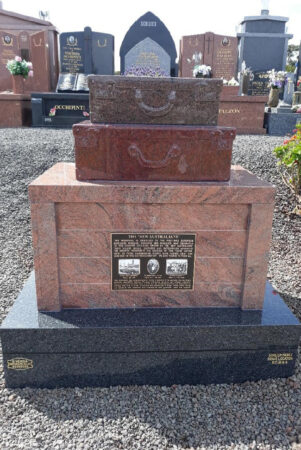By Millie Schillick
A memorial has been installed in Williamstown Cemetery honouring European migrants and refugees who arrived in Australia after the end of WW2.
The war had devastated Europe which lay in ruins and created chaos with millions of people displaced from their countries. Most had lost their belongings, families, friends and homes, and were unable or unwilling to return to their homelands. These stateless people had nowhere to go and were living in overcrowded refugee camps which had been set up around Europe.

In 1945 Australia was underdeveloped and underpopulated so the Australian Government devised the assisted ship passage migration scheme called ‘Populate or Perish’ which resulted in half a million British arriving by ship. In 1947 the assisted passage program was extended to include Eastern Europeans and people from the Baltic States, who arrived poor with only a suitcase and a trunk of meagre belongings. However, they did have ample faith, hope and determination to succeed in their new lives. Hard manual labour did not scare them – after all they had survived WW2.
Upon arrival these newcomers were generally housed in disused, run-down Army and RAAF barracks and empty warehouses, usually located on the outskirts of towns and cities. The warehouses were converted into living quarters using plywood partitioning to create cubicle style small rooms which provided minimal privacy or comfort. The showers and toilets were communal and the food served in the cafeterias was bland and mostly unpalatable. In some hostels the migrants rioted for better food and the problem was solved when the Europeans were allowed to do their own cooking which made people happier.
The work allocated to these migrants generally was the hardest, dirtiest and most undesirable of jobs – usually in factories, manufacturing and manually intensive labour. They were obliged to work for two years at whatever job was assigned to them as repayment to the Australian Government for their assisted ship passage.
The Europeans had to overcome the searing hot summers, the language barriers, substandard living conditions, and often racist and distressing treatment by some of the public. The Government urged these new migrants to learn to speak English and to quickly assimilate into the Australian way of life.
Between 1945 and 1965, two million Europeans emigrated to Australia. It is this particular group of foreigners then called ‘The New Australians’ who contributed greatly to the growth, development and prosperity of this country. They deserve recognition, acknowledgment and many thanks for their enriching cultures, culinary skills, and on-going enterprising talents and trades. They changed the face of this nation forever. Many of these commendable Europeans are now laid to rest in Williamstown Cemetery and other cemeteries around Australia.
Thank you to The Greater Metropolitan Cemeteries Trust for donating the memorial site which is located on the edge of the road leading to the Mausoleum in Williamstown Cemetery. Theinstallation coincides with the 80th Anniversary of the end of WW2 inEurope.

